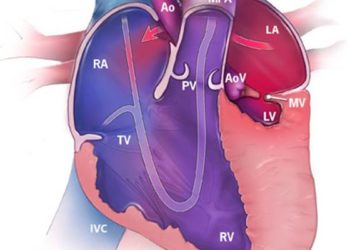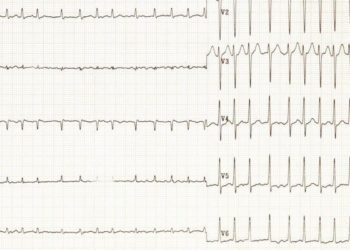Early initiation of rhythm-control for atrial fibrillation associated with lower risk of adverse cardiovascular outcomes
1. Compared to patients only receiving rate-control treatment, those who received rhythm-control treatment within one year of diagnosis of atrial fibrillation had a lower risk of adverse cardiovascular outcomes.
2. This association was not seen if the treatment was initiated over one year after the diagnosis of atrial fibrillation.
Evidence Rating Level: 2 (Good)
Study Rundown: As the aging population grows, the prevalence of atrial fibrillation increases along with it. While rate-control therapy and anti-coagulation provide some benefit, these patients are still at high risk of stroke and sudden death due to heart failure, especially during the first year after diagnosis. In a recent randomized-control trial, rhythm-control therapy (antiarrhythmic drugs, cardioversion, and ablation) was shown to be associated with a lower risk of adverse cardiovascular events than usual care in early atrial fibrillation patients. In response, this Korean study investigated the effectiveness of rhythm-control therapy versus rate-control therapy, in the context of those recently diagnosed in the past year. Using data from the NHIS of Korea, eligible patients were sorted into early versus late atrial fibrillation treatment, based on timing of treatment initiation being less or more than a year since diagnosis. The primary composite outcomes were cardiovascular death and treatment safety. In conclusion, no difference was found in the primary outcome between rate and rhythm-control in those whose treatment was initiated over a year after first diagnosis. Conversely, those in the early treatment group were shown to have significantly lower risk of adverse cardiac events with rhythm-control therapy than rate-control therapy. No safety differences were found between the two treatment groups, regardless of the timing of treatment initiation. Strengths of this study include its use of large-scale data, encompassing 97% of the Korean population, increasing its external validity in a clinical setting. Despite this, data on other variables was unfortunately limited, such as severity of the condition, as well as physician reasoning for choosing rhythm-control over rate-control, which could be an entry point for bias. Nevertheless, this study added further support that early initiation of rhythm-control treatment could be of benefit to those with atrial fibrillation over rate-control therapy alone.
Click to read the study in the BMJ
Relevant Reading: Early rhythm-control therapy in patients with atrial fibrillation
In-Depth [retrospective cohort]: This study used similar inclusion criteria to the EAST-AFNET 4 randomized-control trial. Using the NHIS of Korea since July 2011, atrial fibrillation patients were included if they were older than 75, had a history of TIA or stroke or met two of the following minor conditions: female, age > 65, heart failure, hypertension, diabetes mellitus, previous MI, or CKD. 6,312 and 16,323 patients were in the late and early treatment groups, as defined by initiation of treatment after or less than a year since first diagnosis. The primary outcome was a composite of death from different cardiovascular causes. The safety outcome was a composite of death from any cause, hospital admission or prespecified complications of rhythm-control treatment. Follow-up was done until 31 December 2015 or until death. Deaths within 180 days since the first prescription were not included. Results showed significant difference in hazard ratios between rhythm-control (7.42) vs. rate-control (9.25) in the early treatment group (hazard ratio 0.81, 95% CI 0.71-0.93; p=0.002). This association was not significant in the late treatment group. No difference in safety outcomes between the two treatments in both the early and late groups.
Image: PD
©2021 2 Minute Medicine, Inc. All rights reserved. No works may be reproduced without expressed written consent from 2 Minute Medicine, Inc. Inquire about licensing here. No article should be construed as medical advice and is not intended as such by the authors or by 2 Minute Medicine, Inc.








